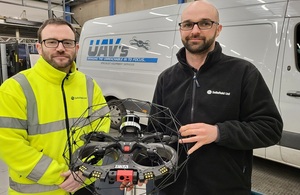Groundbreaking flights at Sellafield lead the way in safety
Unmanned Aerial Vehicle flights are successfully flown on the Sellafield site.

From left: Peter King, technical specialist and Sam Jay, UAV engineer and chief pilot, at Sellafield Ltd’s Engineering Centre of Excellence, with the Flyability Elios 3 drone.
Drone pilots have successfully completed 2 flight firsts on the Sellafield site leading the way to increased safety of employees during decommissioning.
The successful deployment of the Elios 3 drone equipped with a LiDAR sensor marks a major milestone for the Unmanned Aerial Vehicle (UAV) team, enabling Sellafield Ltd to achieve unparalleled efficiency in mapping and 3D modelling.
Hot on the heels of this first flight the team then successfully flew the Elios 3 drone with a RAD (radiation activity detection) dosimeter which they hope will allow them to map radiation hotspots in areas before other colleagues go into unused areas of the Sellafield site.
Amanda Smith, UAV equipment programme lead, Sellafield Ltd, highlighted the safety and financial benefits of deploying a drone for the mapping.
She said:
We’re thrilled that this first flight of Elios 3 with the LiDAR payload was a success and the data collected is now being processed in a Computer Aided Design system which will produce a 3D model of the area in question, helping to inform engineering decisions going forwards.
Sending a drone into this tight and unused space rather than an employee in the first instance reduces risk, and also saves time and money.
The team put a lot of work into making sure they were fully prepared for this flight. There are building plans they can study and try to work out the best route for the drone to take.
Sam Jay, UAV equipment engineer and chief pilot, Sellafield Ltd said:
The flights can be very intense and in this case there was pipework everywhere. The drones fly in a cage with sensors so if they do happen to touch anything they won’t be damaged.
The hardest part is remembering your way out again. In such a short space of time you need to get in and out quickly. There can be a lot of pressure as not getting the drone out and having to send someone in after it would defeat the point of the flight.
Now that we have scanned the area the engineers can design scaffolding before they go to unblock a pipe which has been causing an issue in this particular area. By deploying the drone, and speeding up the process we have potentially saved the company, and the taxpayer, hundreds of thousands of pounds.
Buoyed by the success of this flight, Sellafield made history again recently as the first UK nuclear site to employ a drone equipped with a radiation monitor.
This innovative addition aims to assess radiation levels and identify potential hot spots in areas where radiation exposure levels are unknown.
The deployment of the drone with a radiation payload demonstrates the organisation’s commitment to exploring innovative solutions for radiation assessment, reducing risk to those working on the Sellafield site.